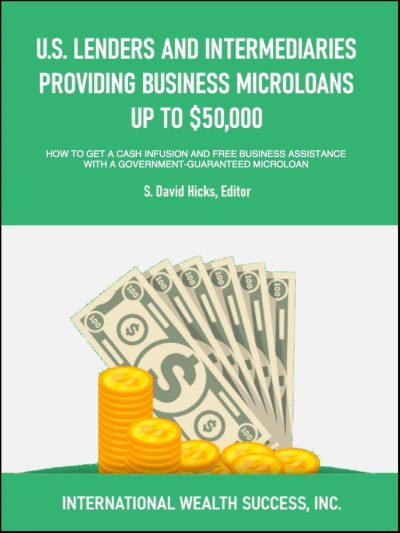Let’s use the worst-case principle to explore ways you can obtain capital without a credit rating. I’m not saying you find it impossible to obtain credit — we’re talking about Mr. Worst Case. He’s a guy who really needs help. All of us can learn something from his experiences.
Mr. Worst Case needs what for him is a large sum of money, say $15,000, to buy a billiard room that is currently showing a profit of $20,000 per year. The price of the billiard room is $25,000, but Mr. Worst Case needs only $15,000 for the cash down payment. He goes to a bank and asks the loan officer for a $15,000 loan. He tells the loan officer all about the business: its current income; future prospects, and the excellent calibre of its customers.
The loan officer listens intently until Mr. Worst Case is finished. Then the loan officer asks some questions:
- Does Mr. Worst Case have a savings account in this bank?
- Does he have his checking account in this bank?
- Does he have his safe deposit box in this bank?
- Does Mr. Worst Case have any collateral to put up?
- Does he have a credit rating at this or another bank?
Mr. Worst Case answers no to each question. As the loan officer continues to ask questions, Mr. Worst Case slowly begins to realize that his chances of obtaining the loan are nil. Finally, the loan officer says, “I’m sorry, sir. We like to make good loans. But you don’t do business with us regularly. You don’t have a credit rating at this or any other bank. Therefore we can’t lend you the $15,000.”
Mr. Worst Case is determined to buy that billiard room. He goes from one bank to another, improving his story and presentation at each. But without a credit rating, and with almost no banking record, he fails to obtain the money. Someone else buys the lucrative billiard room and begins a climb toward riches.
IWS-57 : U.S. Lenders and Intermediaries Providing Business Micro-loans Up to $50,000
U.S. Lenders and Intermediaries Providing Business Microloans Up to $50,000 is a detailed listing of every microloan intermediary lender in the country, arranged by state. Microloan intermediaries are community-based organizations dedicated to helping small businesses and startups with loans up to $50,000. Intermediaries work with the Small Business Administration’s guaranteed loan program and with local lenders to provide micro-loans to businesses in need through a simplified, streamlined awards process.
How could Mr. Worst Case obtain a loan?
How could any man in a similar spot obtain a loan of this size?
He could, if he had time and money, open checking and savings accounts in the bank. With this as a start, Mr. Worst Case could borrow a small sum — say $500 — and repay it quickly — say in two months. By taking and repaying a series of loans in increasing amounts, Mr. Worst Case could build a strong credit rating with a bank in a year to eighteen months.
But Mr. Worst Case, like most ambitious wealth builders, doesn’t want to waste time. He wants to buy that billiard room now so he can begin building riches immediately.
What can he do? How can he get a loan if every bank refuses him and he doesn’t have any friends or relatives willing to lend him money?
The Compensating Balance
There is one little-known but startling golden key to his money problem that he can use, you could use, and I do use — the compensating balance.
You can borrow money from companies, small banks, and individuals, for deposit in another bank as collateral for a loan you obtain from that bank. The collateral is called a compensating balance and you are not allowed to withdraw it.
Why can you borrow money for a compensating balance while you cannot borrow a similar sum to invest in a business?
Because when you borrow money for a compensating balance, the money must be deposited in a bank for this purpose and the lender knows exactly where the money is. So he’s wiling to take a greater risk than a bank or individual.
S-11 : Tyler G. Hicks’ Tips for Using OPM and Mortgaging Out to Make Real Estate Millions
Real estate has probably built more fortunes on borrowed money than any other type of business in existence today. You can build your fortune in real estate using borrowed money if you follow the tips given in this book.
Six Steps to Obtaining OPM
Now let’s see how Mr. Worst Case can finance his billiard room or any other business using this golden technique. He takes these six steps:
- Obtain $15,000 compensating balance
- Deposit compensating balance in savings account at bank
- Give passbook to compensating-balance lender as collateral
- Borow $15,000 from bank using compensating balance as collateral
- Buy billiard room with $15,000 down payment
- Use billiard-room profits to pay off $15,000 loan
Thus, Mr. Worst Case finances his business without investing a penny of his own.
Where can you find organizations and people interested in lending money for compensating balances?
You have the world at your fingertips, my friend! Search online and you will find plenty of lenders willing to give you a compensating balance for your needs. Likewise, you’ll find plenty of money available opportunities in the IW$ Newsletter.
Are compensating-balance funds free?
No! Just like everything else in life, it costs money to borrow money. But the cost is low — three-quarters of one per cent per year is a typical cost. To offset this cost you’ll receive 4 per cent, or more, interest on the compensating balance funds deposited in the savings account. What’s more, the loan you make at the bank wil be at a lower interest rate because you have full collateral.
Other Uses of a Compensating Balance
Let’s say Mr. Worst Case needed only $3,000 cash immediately but might need an additional $12,000 within the next few months. He could use his compensating balance to set up a line of credit — i.e., the bank would allow him to write checks for sums up to $15,000 for business purposes. Some banks will allow you a line of credit up to 80 per cent of the compensating balance. With a $15,000 compensating balance this would be 0.80 (15,000) = $12,000 line of credit. Other banks wil grant a line of credit up to 100 percent of the compensating balance. Check the banks in your local area to determine their practices.
With a compensating balance, the vice-president of any bank will welcome you when you apply for a loan. He’ll ask only two questions:
- How much money do you have for the compensating balance?
- How much do you want to borrow?
So long as (2) is less than, or equal to, (1) you won’t have any trouble.
Now go and get your money and make your fortune!







